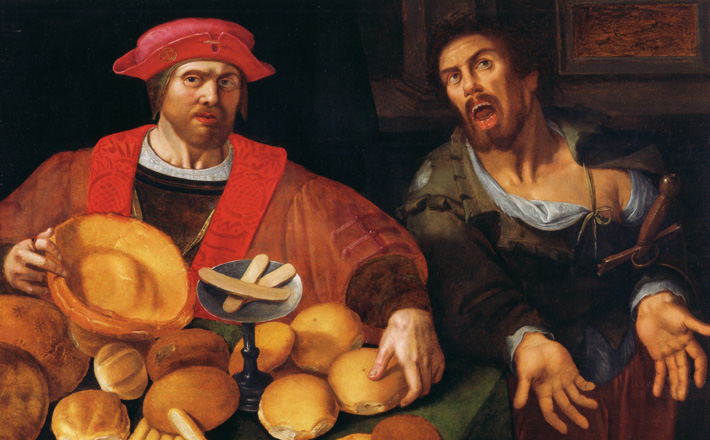Commentary on Jeremiah 8:18—9:1
Jeremiah demonstrates to us the confidence of the Israelite.
This is a strange way to start a reflection on a difficult lament, but we must understand the lament’s power. Too often as Christians, we edit our prayers to God. We speak frankly to friends, advisors, and paid professionals, but we don’t speak frankly to God. Jeremiah holds nothing back from God and models a prayer life of both praise and lament.
I recently had the great fortune of traveling in Holy Land and often had Jeremiah in my head while I was there. I visited a synagogue that tradition tells us he preached at in Cairo, Egypt. I also visited the ruins of the sanctuary in Shiloh just 18 miles north of Jerusalem that Jeremiah urged the leaders of Jerusalem to consider when they felt the Temple guaranteed them safety (chapters 7 and 26).
The Book of Jeremiah is one of the most important books of the Old Testament as well as one of the longest. Few prophets probably helped Jesus to understand himself as much as Jeremiah. Like Jeremiah, Jesus begins his public ministry in Matthew and Mark’s gospels with strong words of denunciation before he moves to a ministry of hope.
The people’s arrogance and entitlement may be the greatest difficulties that Jeremiah encountered. We hear clearly in verse 19 the people’s false expectation. They expected the Lord to always be at their beck and call. We can understand this as a distorted Zion theology. We hear the people wondering why the Lord is no longer in Zion. Jeremiah’s constant concern revolves around this superstitious belief of the temple’s power, be it in Zion or Shiloh. The people do not strengthen their relationship with God and each other; rather, they put their trust in the inanimate objects in Zion and Jerusalem’s reputation of being invulnerable. Jeremiah directs them to Shiloh if they think anything is invulnerable.
We find idolatry at the heart of the complaint in verses 19-20. Ultimately, we can see this as popular religiosity can terribly awry. We see the problems of foreign gods throughout the Old Testament. We get a sense of people turning everywhere for some way to leverage their relationship with God. First, they try Zion. Next, they try idols. They seem to be turning everywhere except to God and each other. Even in verse 20, there is some sense that something magical would happen at the end of the summer harvest. The people have managed to make both idols and idols out of religious feasts at the year’s end.
Jeremiah forces us to confront idolatry in our own lives. We can easily laugh at the Israelite worshiping wooden idols, but what really controls our life? Are we obsessed with the latest technology and consumer goods? We can see Israel’s unhealthy obsession with Zion here, but what do we fail to see in our own lives? I was recently at a children’s soccer game with many parents on the sidelines, but then I noticed about half the people were looking at their smart phones instead of their children. Now maybe this was out of necessity, but maybe the smart phone is becoming an idol. One could not be blamed for thinking this if we see how advertising for them functions.
Jeremiah can see this catastrophe coming. We see his mood becoming more and more desperate. The alarm increases in verse 22. Gilead was some of the richest and most fertile land historically possessed by Israel. Now, nothing even in Gilead can offer this people healing and salvation. Jeremiah seems to have recognized that Israel has gone past the point of no return.
Jeremiah 9:1 both concludes this pericope and leads into a long jeremiad for which Jeremiah is so famous. The grief and sickness of verse 18 is now replaced by a “fountain of tears” and weeping “day and night.” Jeremiah resorts to extreme emotions in order to try to shake Israel of her complacency. Jeremiah starts the pericope with great frustration and concludes it with great emotion. Utter grief has replaced the despair of the beginning.
These verses continue to resonate with both Christians and Jews as they confront the troubles of today’s world. What would Jeremiah say if he heard that more soldiers died from their own hand than in combat last year in Afghanistan? What should we say? How would Jeremiah react if he heard that 22 veterans a day commit suicide? Jeremiah 8:18-9:1 still tries to shake us from our complacency.
Jeremiah nicely complements Jesus’ parable of the dishonest manager. Here we see someone shaken free of complacency. As so often happens in the parables, disciples’ conventional morality is challenged by the necessity of the circumstances. Drastic times call for drastic measures. Jesus offers us the example of someone who can at least hear and respond. Perhaps more than anything else, Jeremiah is trying to wake us up. He failed with Jerusalem, but this passage continues to resonate with any group open to change. The Dishonest Manager shows that change is not always pretty, but it is a necessity that Jeremiah’s listeners failed to understand. Let us hope that Jeremiah can awaken us from our slumber.


September 22, 2013